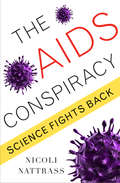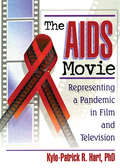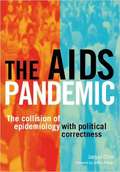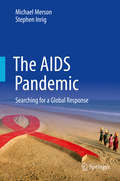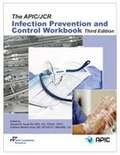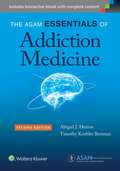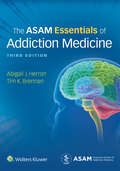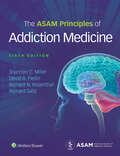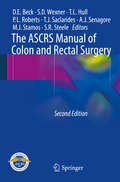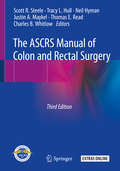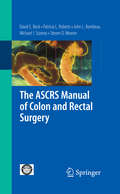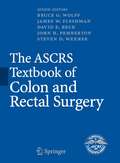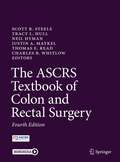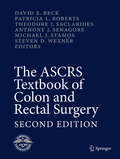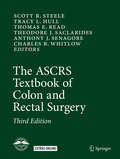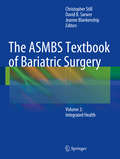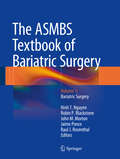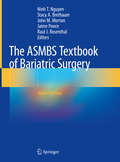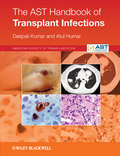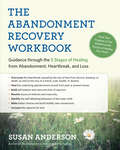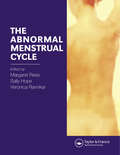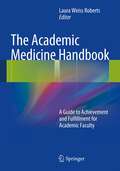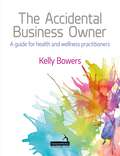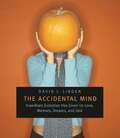- Table View
- List View
The AIDS Conspiracy: Science Fights Back
by Nicoli NattrassSince the early days of the AIDS epidemic, many bizarre and dangerous hypotheses have been advanced to explain the origins of the disease. In this compelling book, Nicoli Nattrass explores the social and political factors prolonging the erroneous belief that the American government manufactured the human immunodeficiency virus (HIV) to be used as a biological weapon, as well as the myth's consequences for behavior, especially within African American and black South African communities. Contemporary AIDS denialism, the belief that HIV is harmless and that antiretroviral drugs are the true cause of AIDS, is a more insidious AIDS conspiracy theory. Advocates of this position make a "conspiratorial move" against HIV science by implying its methods cannot be trusted and that untested, alternative therapies are safer than antiretrovirals. These claims are genuinely life-threatening, as tragically demonstrated in South Africa when the delay of antiretroviral treatment resulted in nearly 333,000 AIDS deaths and 180,000 HIV infections -- a tragedy of stunning proportions. Nattrass identifies four symbolically powerful figures ensuring the lifespan of AIDS denialism: the hero scientist (dissident scientists who lend credibility to the movement); the cultropreneur (alternative therapists who exploit the conspiratorial move as a marketing mechanism); the living icon (individuals who claim to be living proof of AIDS denialism's legitimacy); and the praise-singer (journalists who broadcast movement messages to the public). Nattrass also describes how pro-science activists have fought back by deploying empirical evidence and political credibility to resist AIDS conspiracy theories, which is part of the crucial project to defend evidence-based medicine.
The AIDS Conspiracy: Science Fights Back
by Nicoli NattrassSince the early days of the AIDS epidemic, many bizarre and dangerous hypotheses have been advanced to explain the origins of the disease. In this compelling book, Nicoli Nattrass explores the social and political factors prolonging the erroneous belief that the American government manufactured the human immunodeficiency virus (HIV) to be used as a biological weapon, as well as the myth's consequences for behavior, especially within African American and black South African communities.Contemporary AIDS denialism, the belief that HIV is harmless and that antiretroviral drugs are the true cause of AIDS, is a more insidious AIDS conspiracy theory. Advocates of this position make a "conspiratorial move" against HIV science by implying its methods cannot be trusted and that untested, alternative therapies are safer than antiretrovirals. These claims are genuinely life-threatening, as tragically demonstrated in South Africa when the delay of antiretroviral treatment resulted in nearly 333,000 AIDS deaths and 180,000 HIV infections—a tragedy of stunning proportions.Nattrass identifies four symbolically powerful figures ensuring the lifespan of AIDS denialism: the hero scientist (dissident scientists who lend credibility to the movement); the cultropreneur (alternative therapists who exploit the conspiratorial move as a marketing mechanism); the living icon (individuals who claim to be living proof of AIDS denialism's legitimacy); and the praise-singer (journalists who broadcast movement messages to the public). Nattrass also describes how pro-science activists have fought back by deploying empirical evidence and political credibility to resist AIDS conspiracy theories, which is part of the crucial project to defend evidence-based medicine.
The AIDS Movie: Representing a Pandemic in Film and Television
by Kylo-Patrick R HartAre people with HIV/AIDS treated fairly in films?Here is a compelling book that provides you with a thorough examination of how HIV/AIDS is characterized and portrayed in film and how this portrayal affects American culture. The AIDS Movie: Representing a Pandemic in Film and Television uncovers the primary ways that films about HIV/AIDS influence American ideology and contribute to society's view of the disease. In The AIDS Movie, professors and scholars in the areas of popular culture, film, sociology, and gay and lesbian studies will discover cross-cultural approaches that can be used to analyze the representation of AIDS in American films made in the first two decades of the pandemic. Giving you insight into the production and circulation of social meanings pertaining to HIV/AIDS, this study explores the social ramifications of such representations for gay men in American society, as well as for the rest of the population. Interesting and informative, The AIDS Movie: Representing a Pandemic in Film and Television examines the ways that AIDS has been represented in American movies over the past two decades, defines and proposes criteria for identifying an “AIDS movie” and explores how these images shape social opinions about AIDS and gay men. The AIDS Movie discusses several character types such as “innocent victims” and “guilty villains” and the process of victim-blaming that occurs in AIDS movies. Defining an “AIDS movie” as a film with at least one character who either has been infected with HIV, has developed AIDS, or is grieving the recent death of a loved one from AIDS, this guide bases standards for these movies on several works, including: Chocolate Babies It's My Party Jeffrey The Living End Grief An Early Frost Men in Love A Place for Annie Philadelphia The Ryan White Story Gia Boys on the SideThe AIDS Movie: Representing a Pandemic in Film and Television is compelling and insightful as it cleverly reveals how AIDS is portrayed in cinema and television, and how that portrayal affects American culture.
The AIDS Pandemic: The Collision of Epidemiology with Political Correctness
by James Chin Alan GilliesThis work includes a foreword by Jeffrey Koplan, Vice President, Academic Health Affairs, Emory University, Atlanta, Formerly Director, Centers for Disease Control and Prevention (CDC). This groundbreaking new book blows apart the myths about who is at risk of getting AIDS and shows how these myths are driven by moral and political pressures. It provides an objective, logical, clear, epidemiologically based analysis on the current situation and situates itself firmly at marked variance with the politically correct position of UNAIDS and most AIDS activists. "The AIDS Pandemic" argues that the story of HIV has been distorted by UNAIDS and AIDS activists in order to support the myth of the high potential risk of HIV epidemics spreading into the general population. In the past, most policy makers and members of the public have uncritically accepted UNAIDS' high prevalence estimates and projections when in fact lower HIV prevalence estimates are more accurate. Time, money and resources are being wasted worldwide. This book is full of fresh analysis for all people working in any capacity in HIV/AIDS programmes. It will be invaluable to undergraduate and postgraduate healthcare students, health and social care professionals and the international media. Policy makers and shapers will find the pioneering information crucial to the future of the AIDS strategy. 'For close to a half century, my work as a public health epidemiologist has involved field research, program management, and teaching, mostly on public health surveillance and prevention and control of communicable diseases. [Since 1981] I have been involved virtually full time with the international response to the AIDS pandemic which is without question one of the most severe infectious disease pandemics in modern times. During my public health career that began in the early 1960s, I have always been considered a part of conventional or mainstream medical science. However, since the mid-1990s, I have found myself swimming upstream against mainstream AIDS organisations. I have, during this period, gradually come to the realisation that AIDS programs developed by international agencies and faith based organizations have been and continue to be more socially, politically, and moralistically correct than epidemiologically accurate.' - James Chin, in the Preface. 'Controversy and differing opinions have been hallmarks of the AIDS epidemic since its onset. The scope of the problem, how to identify high risk groups without increasing the burden of stigma, the safety of blood products, the best balance between prevention and treatment, have all been hot issues sometimes dividing the public health community. The passion and conflicts about how to consider and address the AIDS pandemic reflect the huge impact this disease has had globally and its interplay with macro economic, legal, social, political, national security and ethical domains. Vital, provocative, thoughtful, direct, passionate, rational and willing to challenge conventional wisdom. "The AIDS Pandemic" is filled with information, rational arguments and opinions, often intermingled. It is a rare book on epidemiology that puts so much of the author's personality and viewpoints, along with his knowledge and experience, before the reader. The result is a thought-provoking, likely-to-be-controversial, contribution to the AIDS literature that should engage and stimulate the reader.' - Jeffrey Koplan, in the Foreword.
The AIDS Pandemic: The Search For A Global Response
by Michael Merson Stephen InrigThis ambitious book provides a comprehensive history of the World Health Organization (WHO) Global Programme on AIDS (GPA), using it as a unique lens to trace the global response to the AIDS pandemic. The authors describe how WHO came initially to assume leadership of the global response, relate the strategies and approaches WHO employed over the years, and expound on the factors that led to the Programme’s demise and subsequent formation of the Joint United Nations Programme on HIV/AIDS (UNAIDS). The authors examine the global impact of this momentous transition, portray the current status of the global response to AIDS, and explore the precarious situation that WHO finds itself in today as a lead United Nations agency in global health. <P><P> Several aspects of the global response – the strategies adopted, the roads taken and not taken, and the lessons learned – can provide helpful guidance to the global health community as it continues tackling the AIDS pandemic and confronts future global pandemics.
The APIC/JCR Infection Prevention And Control Workbook
by Barbara SouleThe APIC/JCR Infection Prevention and Control Workbook
The ASAM Essentials Of Addiction Medicine
by Abigail J. Herron Timothy Koehler BrennanA masterful, high-yield guide to the treatment of substance abuse issues, The ASAM Essentials of Addiction Medicine equips you with the expert know-how you need to provide effective help for your patients. Derived from The ASAM Principles of Addiction Medicine, 5th Edition - widely hailed as the definitive comprehensive clinical reference in the field - this companion resource presents the collective wisdom of hundreds of esteemed authorities on the art and science of addition medicine. Yet, it does so in a succinct format that will appeal to specialists seeking a more streamlined, quick-access reference source. -Find the authoritative answers you need on everything from the pharmacology of addiction through diagnosis, assessment, and early intervention; various forms of addiction management. . . treatment of individual patient populations; management of intoxication and withdrawal; pharmacologic and behavioral interventions; recovery programs; medical disorders and complications. . . co-occurring addiction and psychiatric disorders; pain and addiction; children and adolescents; and ethical, legal, and liability issues. -Contribute to public health in the area of addiction thanks to a special introductory chapter entitled A Public Health Approach to Prevention: The Health Professional,,s Role. -Easily switch back and forth between the ASAM Essentials and the parent text thanks to a parallel chapter organization. -Zero in on the most important, practical information thanks to highly focused, efficient coverage. -Maximize your understanding and retention of vital concepts with the aid of key points summaries, review questions, and suggested readings in each chapter.
The ASAM Essentials of Addiction Medicine
by Abigail Herron Timothy K. BrennanDerived from ASAM’s definitive work,Principles of Addiction Medicine, 6th Edition, this companion resource is ideal for residents, fellows, and practitioners in psychiatry, as well as addiction medicine specialists and other healthcare workers who provide care to patients with substance use disorders. Streamlined and easy to use, the Essentials volume provides authoritative information on everything from the pharmacology of addiction through diagnosis, assessment, and early intervention—all in concise, easy-to-navigate format for ease of reference.
The ASAM Principles of Addiction Medicine
by Shannon MillerPublisher's Note: Products purchased from 3rd Party sellers are not guaranteed by the Publisher for quality, authenticity, or access to any online entitlements included with the product. Thoroughly updated with the latest international evidence-based research and best practices, the comprehensive sixth edition of the American Society of Addiction Medicine’s (ASAM) official flagship textbook reviews the science and art behind addiction medicine and provides health care providers with the necessary information to not only properly diagnose and treat their patients, but to also serve as change agents to positively impact clinical service design and delivery, as well as global health care policy.
The ASCRS Manual of Colon and Rectal Surgery
by David E. Beck Michael J. Stamos Anthony J. Senagore Theodore J. Saclarides Patricia L. Roberts Steven D. Wexner Tracy L. Hull Scott R. SteeleThe ASCRS Manual of Colon and Rectal Surgery, Second Edition is designed to provide a rapid access pocket reference for residents, fellows, private clinicians, and allied health professionals caring for patients with colorectal surgical diseases. The Manual, abstracted from the ASCRS Textbook of Colon and Rectal Surgery, Second Edition, is intended to impart succinct, clinically relevant information for daily patient care. The chapters take an evidence-based approach and many provide ASCRS practice parameters. The contents are presented consistently, with concise overviews of the most clinically relevant topics. The disease chapters discuss etiology, anatomic considerations, patient evaluation, lab results, imaging, diagnosis and treatment. The surgical chapters address these same issues, in addition to discussion of minimally invasive versus open techniques, possible complications, and perioperative care. The Manual also includes anatomical and technique drawings, operative photos and algorithms. Concise yet comprehensive, The ASCRS Manual of Colon and Rectal Surgery, Second Edition is very useful for physicians and researchers dealing with diseases of the colon and rectum.
The ASCRS Manual of Colon and Rectal Surgery
by Tracy L. Hull Scott R. Steele Justin A. Maykel Thomas E. Read Charles B. Whitlow Neil HymanColorectal Surgery has continued to experience tremendous growth in both the community and academic settings over the past few years. The recent increase in demand for colorectal specialists has been fueled by an overwhelming number of applications to fellowship training programs, resulting in some of the most coveted and competitive positions. Furthermore, the accumulation of experience, knowledge, and wisdom from pioneers in the field, combined with major recent technological advances, has transformed the clinical management of diseases of the colon and rectum. Colorectal Surgeons have embraced advances ranging from minimally invasive approaches for complex problems to novel training methods for future generations. Additionally, we have spearheaded innovations in the management of colorectal cancer, pelvic floor disorders, diverticulitis, inflammatory bowel disease, and anorectal conditions. Despite these improvements, there remains a seemingly never-ending mixture of complex patient disease processes and complications resulting from the care of these patients. Even in cases where the technical challenges were managed successfully, complications or poor function may result in dramatic life-long consequences, reduced quality of life, as well as having economic implications. The American Society of Colon and Rectal Surgeons (ASCRS) is the premiere professional organization of Colon and Rectal Surgeons. Three editions of the ASCRS Textbook of Colon and Rectal Surgery have been published and have proved to be extremely valuable for their wealth of general information and knowledge, providing not only background information, but also specifics regarding the more complex situations that surgeons who treat patients with colorectal disease experience on a regular basis. An ASCRS manual was produced in in 2009 and 2014, each accompanying their original textbooks. This has been formed by abstracting the textbook into a bullet format; all figures and most tables were retained. The 3rd edition of the Textbook (published by Springer) included completely new chapters and authors. This 3rd edition of the Manual is indicated to conform to the new edition of the Textbook and incorporate newer information in the field of colon and rectal surgery. This Manual will serve as a very useful resource for physicians and researchers dealing with diseases of the colon and rectum. It will provide a concise yet comprehensive summary of the current status of the field that will help guide education, patient management and stimulate investigative efforts. All chapters were written and abstracted by experts in their fields and will include the most up to date scientific and clinical information.
The ASCRS Manual of Colon and Rectal Surgery
by Steven Wexner David E. Beck John L. Rombeau Michael J. StamosThe ASCRS Textbook of Surgery of the Colon and Rectum offers a comprehensive textbook designed to provide state of the art information to residents in training and fully trained surgeons seeking recertification. The textbook also supports the mission of the ASCRS to be the world's authority on colon and rectal disease. The combination of junior and senior authors selected from the membership of the ASCRS for each chapter will provide a comprehensive summary of each topic and allow the touch of experience to focus and temper the material. This approach should provide the reader with a very open minded, evidence based approach to all aspects of colorectal disease. Derived from the textbook, The ASCRS Manual of Surgery of the Colon and Rectum offers a "hands on" version of the textbook, written with the same comprehensive, evidence-based approach but distilled to the clinical essentials. In a handy pocket format, readers will find the bread and butter information for the broad spectrum of practice. In a consistent style, each chapter outlines the condition or procedure being discussed in a concise outline format - easy to read, appropriately illustrated and referenced.
The ASCRS Textbook of Colon and Rectal Surgery
by James W. Fleshman Steven Wexner David E. Beck P. L. Roberts Bruce G. Wolff J. Garcia-Aguilar J. M. Church M. J. Stamos T. J. Saclarides John H. PembertonThe ASCRS Textbook of Colorectal Surgery is the first official textbook of the American Society of Colon and Rectal Surgeons, adhering to the principals of evidence-based practice and utilizing ASCRS practice parameters. Each chapter correlates with the core curriculum developed by the Program Director's Association in Colorectal Surgery. In addition, a ground-breaking online component is updated periodically with new information.
The ASCRS Textbook of Colon and Rectal Surgery
by Tracy L. Hull Scott R. Steele Justin A. Maykel Thomas E. Read Charles B. Whitlow Neil HymanThis book serves as a valuable resource for surgeons and health care providers at all stages of their career caring for patients with colorectal disease. This edition provides all newly written chapters, organized around the “pillars” of colorectal disease: perioperative (including endoscopy); anorectal disease; benign disease (including inflammatory bowel disease); malignancy; pelvic floor disorders; and a “miscellaneous” section that covers aspects both inside and beyond the operating room. Chapters are formatted to follow that of a “how to” manual as well as an algorithm-based guide to allow the reader to understand the thought process behind a proposed treatment strategy. By making use of evidence-based recommendations, each chapter includes not only background information and diagnostic/therapeutic guidelines, but also provides operative technical details and perioperative “tips and tricks” that are utilized in the management of these complex surgical challenges. Chapters also include the assessment of risk and methods utilized to minimize perioperative complications. In addition, the book incorporates sections covering the medical and surgical therapies for abdominal, pelvic and anorectal disease. Written by experts in the field from around the world, The ASCRS Textbook of Colon and Rectal Surgery 4th Edition exposes the many critical gaps in our knowledge base and inspires the next generation to answer them through thoughtful and high level scientific inquiry.
The ASCRS Textbook of Colon and Rectal Surgery: Second Edition
by Steven Wexner David E. Beck Michael J. Stamos Anthony J. Senagore Theodore J. Saclarides Patricia L. RobertsDeveloped in conjunction with the American Society of Colon and Rectal Surgeons, this comprehensive textbook provides readers with the full scope of surgical practice for patients with diseases of the colon and rectum. Expert surgeons, all active both as educators and with busy clinical practices, have written concise and practical chapters on the most commonly done procedures while providing much-needed insight on less frequently presentations, as well. The ASCRS Textbook is designed to meet the needs not only of colorectal specialists, but also the general surgeon in practice whose caseload includes patients with disorders and diseases of the colon, rectum and anus. Residents and fellows will also find a wealth of hands-on guidance and practical tips and tricks. The ASCRS Practice Parameters are incorporated in the book along with an appendix providing the most up-to-the minute access to best practice guidelines. Patient care and safety are addressed in each chapter. "[The ASCRS Textbook of Colon and Rectal Surgery] is a long awaited textbook for those in the field and it does not disappoint. It is brief and to the point, but does not lack the necessary detail expected from a society-produced publication. [It has an] easy-to-read quality that enhances comprehension for the trainee. It is by no means just a student textbook. The inclusion of "hot" current topics, like the anal fistula plug, makes it fresh and useful for experienced surgeons. This is an excellent addition to the colorectal library." (Doody's Review)
The ASCRS Textbook of Colon and Rectal Surgery: Second Edition
by Anthony J. Senagore Theodore J. Saclarides Tracy L. Hull Scott R. Steele Thomas E. Read Charles B. WhitlowThis third edition text provides a completely revised and updated new version of this unique, modern, practical text that covers the strategic evaluation, specific approaches, and detailed management techniques utilized by expert colorectal surgeons caring for patients with complex problems–whether they result from underlying colorectal disease or from complications arising from previous surgical therapy. The format follows that of both a “how to” manual as well as an algorithm-based guide to allow the reader to understand the thought process behind the proposed treatment strategy. By making use of evidence-based recommendations, each chapter includes not only background information and diagnostic/therapeutic guidelines, but also provides a narrative by the author on his/her operative technical details and perioperative “tips and tricks” that they utilize in the management of these complex surgical challenges. Distinctive to this book, is the reliance on experts in the field including past presidents of the ASCRS, as well as multiple other national and internationally recognized surgeons, to lend their personal insight into situations where data may be more sparse, but individual and collective experience is paramount to making sound decisions and thereby optimizing patient outcomes. The text includes chapters on the assessment of risk and methods utilized to minimize perioperative complications. In addition, it incorporates sections covering the medical and surgical therapies for abdominal, pelvic and anorectal disease. Moreover, the technical challenges of managing complications resulting from the original or subsequent operations is addressed. The underlying focus throughout the text is on providing pragmatic and understandable solutions that can be readily implemented by surgeons of varying experience to successfully treat complex colorectal problems. However, it also goes beyond the technical aspects of colorectal surgery and includes special sections highlighting the essence of a surgeon; covering aspects involving the medical-legal, ethical, and economic challenges confronting surgeons. Throughout the text, each author provides an ongoing narrative of his/her individual surgical techniques along with illustrations and diagrams to “personally” take the reader through the crucial steps of the procedure, and key points of patient care inherent to that topic. Additionally, where appropriate, links to online videos give the reader an up-front look into technical aspects of colorectal surgery.
The ASMBS Textbook of Bariatric Surgery
by Christopher Still David B. Sarwer Jeanne BlankenshipDeveloped by the American Society for Metabolic and Bariatric Surgery (ASMBS), The ASMBS Textbook of Bariatric Surgery provides a comprehensive guide of information dealing with the ever evolving field of bariatric surgery. Volume II: Integrated Health is divided into 3 sections: bariatric medicine, psychosocial and nutritional aspects of bariatric surgery. The first section deals with the psychosocial issues associated with morbid obesity. The second section deals with the role of bariatric physicians in preoperative and postoperative support of the bariatric patients. The nutritional section discusses the preoperative and postoperative nutritional support for the bariatric patient. The ASMBS Textbook of Bariatric Surgery will be of great value to surgeons, residents and fellows, bariatric physicians, psychologists, psychiatrists and integrated health members that manage the morbidly obese.
The ASMBS Textbook of Bariatric Surgery
by John M. Morton Ninh T. Nguyen Raul J. Rosenthal Robin P. Blackstone Jaime PonceDeveloped by the American Society for Metabolic and Bariatric Surgery (ASMBS), The ASMBS Textbook of Bariatric Surgery provides a comprehensive guide of information dealing with the ever evolving field of bariatric surgery. Volume 1: Bariatric Surgery covers the basic considerations for bariatric surgery, the currently accepted procedures, outcomes of bariatric surgery including long-term weight loss, improvement and resolution of comorbidities and improvement in quality of life. A section focuses on revisional bariatric surgery and new innovative endoscopic bariatric procedures. Other special emphasis given to the topics of metabolic surgery and surgery for patients with lower BMI (30-35). Volume II: Integrated Health is divided into 3 sections: bariatric medicine, psychosocial and nutritional aspects of bariatric surgery. The first section deals with the psychosocial issues associated with morbid obesity. The second section deals with the role of bariatric physicians in preoperative and postoperative support of the bariatric patients. The nutritional section discusses the preoperative and postoperative nutritional support for the bariatric patient. The ASMBS Textbook of Bariatric Surgery will be of great value to surgeons, residents and fellows, bariatric physicians, psychologists, psychiatrists and integrated health members that manage the morbidly obese.
The ASMBS Textbook of Bariatric Surgery: Volume 1: Bariatric Surgery
by John M. Morton Ninh T. Nguyen Raul J. Rosenthal Stacy A. Brethauer Jaime PonceThe fully updated 2nd edition of this textbook continues to serve as a comprehensive guide for information dealing with the ever-evolving field of bariatric surgery. The chapters are written by experts in the field and include the most up-to-date information, including new sections on quality in bariatric surgery, endoscopic surgery, and management of bariatric complications. This new edition continues to cover the basic considerations for bariatric surgery, the currently accepted procedures, outcomes of bariatric surgery including long-term weight loss, improvement and resolution of comorbidities, and improvement in quality of life. Other special emphasis is given to the topics of metabolic surgery and surgery for patients with lower BMI. In addition, new endoscopic bariatric procedures including the gastric balloons, endoscopic revisional procedures, and newer pharmacotherapy for obesity are reviewed.The ASMBS Textbook of Bariatric Surgery Second Edition will continue to be a leading source of scientific information for surgeons, physicians, residents, students, and integrated health members today and for years to come.
The AST Handbook of Transplant Infections
by Atul Humar Deepali KumarWhether you need to manage a post-transplant infection or reduce the possibility of infection, you will find effective guidance in this handbook. The work of the American Society of Transplantation Infectious Diseases Community of Practice, this reference exclusively uses tables and flowcharts to speed up decision making. This distinguished group of investigators and teachers provide point of care information on optimum management of infection in adult and pediatric organ and stem cell transplant patients. The unique tables and flowcharts are devised by the authors, backed up with extensive references, making the book a fully researched yet easy to use guide. The fast growing specialty of transplantation will be well served by this book as increasing numbers of successful procedures mean transplant teams have to be ever more alert to the possibility of and need for action in the event of ensuing infection.
The Abandonment Recovery Workbook: Guidance through the Five Stages of Healing from Abandonment, Heartbreak, and Loss
by Susan AndersonA powerful workshop-in-a-book for healing from loss One day everything is fine. The next, you find yourself without everything you took for granted. Love has turned sour. The people you depended on have let you down. You feel you’ll never love again. But there is a way out. In The Abandonment Recovery Workbook, the only book of its kind, psychotherapist and abandonment expert Susan Anderson explores the seemingly endless pain of heartbreak and shows readers how to break free—whether the heartbreak comes from a divorce, a breakup, a death, or the loss of friendship, health, a job, or a dream. From the first shock of despair through the waves of hopelessness to the tentative efforts to make new connections, The Abandonment Recovery Workbook provides an itinerary for recovery. A manual for individuals or support groups, it includes exercises that the author has tested and developed through her decades of expertise in abandonment recovery. Anderson provides concrete recovery tools and exercises to discover and heal underlying issues, identify self-defeating behaviors of mistrust and insecurity, and build self-esteem. Guiding you through the five stages of your journey—shattering, withdrawal, internalizing, rage, and lifting—this book (a new edition of Anderson’s Journey from Heartbreak to Connection) serves as a source of strength. You will come away with a new sense of self—a self with an increased capacity to love. Praise for Susan Anderson’s The Journey from Abandonment to Healing: “If there can be a pill to cure the heartbreak of rejection, this book may be it.” — Rabbi Harold Kushner, bestselling author of When Bad Things Happen to Good People
The Abnormal Menstrual Cycle
by Margaret Rees Sally Hope Veronica RavnikarDisorders of menstruation are among the most common problems encountered in womens' health and include early, delayed and irregular menstrual cycles, painful menses and excessive menstrual bleeding, and early menopause. Their treatment presents a variety of complex challenges, especially since some of the treatments used can themselves result in fu
The Academic Medicine Handbook
by Laura Weiss RobertsAttaining professional success and finding personal happiness in academic medicine is not an easy path, yet both are critical if the future is to be brighter through better science, better clinical care, better training, better responsiveness to communities, and better stewardship and leadership in the health professions. This concise, easy to read title consists of "mini" chapters intended as a resource to assist early- and middle-career physicians, clinicians, and scientists in understanding the unique mission of academic medicine and building creative, effective, and inspiring careers in academic health organizations. Organized in eight sections, the Guide covers such areas as finding your path in academic medicine, getting established at an institution, approaching work with colleagues, writing and reviewing manuscripts, conducting empirical research, developing administrative skills, advancing your academic career, and balancing your professional and personal life. Each chapter includes pointers and valuable career and "best practices" strategies in relation to the topic area. An exciting addition to the professional development literature, Achievement and Fulfillment in Academic Medicine: A Comprehensive Guide is an indispensable resource for anyone seeking to achieve a fulfilling career in academic medicine.
The Accidental Business Owner - a friendly guide to success for health and wellness practitioners: A Friendly Guide To Success For Health And Wellness Practitioners
by Kelly BowersA practical and easily accessible guide for bodyworkers and movement teachers, including massage therapists and all other complementary therapists, to the setting up and running of a private practice in order to make it into a successful business.This book is for people who wish they didn't need this book; for people who wish that their passion for their work was all they need to run a business but have learned that it is not. This book provides guidance to give the reader a head for business while maintaining their heart for their work.Filled with practical real-world explanations of basic business skills, it is written with warmth, humor, and an appreciation for the heart-led work of everyone in the health and wellness world. From bookkeeping to financing, business plans to contracts, the reader will find answers to the most basic questions: where do I start and how do I do that?When you love your healing work and need to learn how to run your business this book is the friend you need.
The Accidental Mind
by David J. LindenLinden sets the record straight about the construction of the human brain; rather than the beautifully-engineered optimized device, the absolute pinnacle of design portrayed in many dumbed-down text books, pop-science tomes, and education televisions programs, Linden’s organ is a complicated assembly of cobbled-together functionality that created the mind as a by-product of ad-hoc solutions to questions of survival. His guided tour of the glorious amalgam of crummy parts includes pit-stops in the histories and fundamentals of neurology, neural-psychology, physiology, molecular and cellular biology, and genetics.
